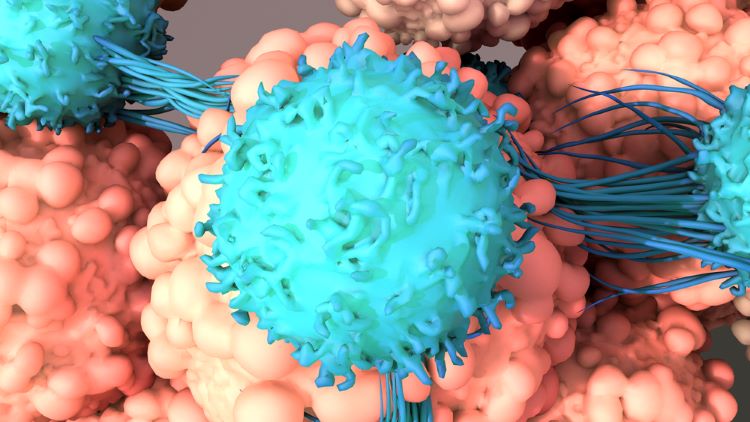Progressing personalised cell therapies in oncology
Posted: 23 May 2024 | Dr Imran Khan (J&J Innovative Medicine) | No comments yet
Dr Imran Khan, PhD, Vice President, Medical Affairs, Hematology, Johnson & Johnson Innovative Medicine discusses the major benefits and current challenges of CAR-T cell therapies, as well as the potential of the company’s novel BCMA-targeted treatment for multiple myeloma.


Last month, CARVYKTI ® (ciltacabtagene autoleucel; cilta-cel) was the first BCMA-targeted CAR-T cell therapy to be approved for second-line treatment of multiple myeloma by the US Food and Drug Administration (FDA).
In this Q&A, Dr Imran Khan, PhD, Vice President Medical Affairs, Hematology at Johnson & Johnson Innovative Medicine, highlights the current landscape of CAR T therapies such as CARVYKTI and touches on the future direction of the sector.
How has the autologous T-cell immunotherapy field progressed in recent years?
Since 2017, six CAR-T cell therapies have been approved by the US Food and Drug Administration (FDA) for the treatment of blood cancers”
While the foundations of cancer treatment, including surgery, chemotherapy, and radiation therapy continue to be critical for treatment; in recent years, new categories have helped transform the treatment paradigm for people with cancer.1 Particularly, CAR-T cell therapy, which uses a patient’s T-cells to fight cancer by altering them so they can find and destroy cancer cells, has emerged as a valuable option for many patients.2 CAR-T can be helpful in treating some types of cancer, even when other treatments are no longer working.
Since 2017, six CAR-T cell therapies have been approved by the US Food and Drug Administration (FDA) for the treatment of blood cancers, including lymphomas, some forms of leukaemia, and, most recently, multiple myeloma.1 Although traditionally, CAR-T cell therapy have only been available until a person’s cancer has already gotten worse after multiple other treatments, with some recent approvals, that notion is beginning to change.2
Why does CARVYKTI have potential in multiple myeloma?
CARVYKTI is the first and only BCMA-targeted treatment approved in the US for the treatment of patients with multiple myeloma who have received at least one prior line of therapy including a proteasome inhibitor (PI) and an immunomodulatory agent and are refractory to lenalidomide.
This approval is based on the results from the Phase III CARTITUDE-4 study, in which treatment with CARVYKTI in one-to-three lines of therapy reduced the risk of disease progression or death by 59 percent compared to standard therapies.
CARVYKTI demonstrated powerful efficacy as a personalised, one-time infusion in the earlier treatment of patients with relapsed/refractory disease”
This earlier line approval is really meaningful, because until now, cell therapies have only been available after a fourth line of treatment has been completed. However, real-world studies show that only an estimated 15 percent of patients initially diagnosed with multiple myeloma are able to start a fifth line of therapy.2 With this new indication, more patients will be able to access this innovative treatment.
CARVYKTI demonstrated powerful efficacy as a personalised, one-time infusion in the earlier treatment of patients with relapsed/refractory disease. Since it is given as a single dose, the treatment will provide more patients with the potential of a period away from their multiple myeloma treatment, now earlier in the course of their disease.
What is the biggest challenge in developing a BCMA-targeted CAR-T cell therapy?
One of the biggest challenges—and greatest benefits— in developing a BCMA-targeted CAR-T cell therapy is its personalised nature. This factor, combined with it being a one-time treatment, means that extensive training, preparation, and certification is required to ensure a positive experience for patients.
However, this personalised approach makes it more complex than other types of therapies.
Considering the demonstrated potential of CARVYKTI, what should the industry consider in developing future CAR-T cell therapies?
Now that CARVYKTI is approved for patients with relapsed or refractory multiple myeloma who have received at least one prior line of therapy, a CAR-T cell therapy is now available for use earlier in the treatment paradigm.
It will also be important for referring physicians like myself, to begin thinking about referrals earlier than they may have traditionally done so in the past. Because multiple myeloma is a relapsing/refractory disease, we must constantly consider what treatment is next, and having CAR-Ts, along with bispecific therapies for patients with relapsed or refractory multiple myeloma has changed the conversation for the better.
What excites you about the future development of personalised immunotherapies?
What excites me the most about the future is that we are entering into a revolutionary era where personalised medicines, including immunotherapies, are more available than ever. As an oncologist, I am thrilled each patient can be treated individually, targeting their specific cancer. This allows us to maximise the potential to help as many patients as possible enter long-term remission.
All of our efforts to develop and discover more personalised immunotherapies are to hopefully realise a cure for multiple myeloma in our lifetimes, and I am so excited to see where we go from here.
About the interviewee


Imran joined Oncology US Medical Affairs in 2018 as the Therapeutic Area Lead, Lymphoma and Myeloid Malignances. Before this, Imran held positions of increasing responsibility in Janssen Oncology R&D. He led clinical studies that resulted in breakthrough approval of DARZALEX and accelerated its review for the first registration and subsequent launch in relapsed/refractory multiple myeloma.
Imran holds an MD from Rutgers New Jersey Medical School and a PhD in Physiology and Biophysics with a dissertation focus on Hematology/Oncology from Albert Einstein College of Medicine.
Outside of Johnson & Johnson, Imran serves as a Clinical Assistant Professor at the Rutgers Cancer Institute of New Jersey and Clinical Assistant Professor in Robert Wood Johnson Medical School.
References
- National Cancer Institute. CAR T Cells: Engineering Immune Cells to Treat Cancer [Internet]. National Cancer Institute. Cancer.gov. 2022. Available from: https://www.cancer.gov/about-cancer/treatment/research/car-t-cells
- American Cancer Society. CAR T-cell Therapy and its side effects [Internet]. www.cancer.org. 2022. Available from: https://www.cancer.org/cancer/managing-cancer/treatment-types/immunotherapy/car-t-cell1.html
Related topics
Big Pharma, Biopharmaceuticals, Clinical Development, Clinical Trials, Drug Development, Industry Insight, Personalised medicine, Research & Development (R&D), t-cells, Therapeutics









